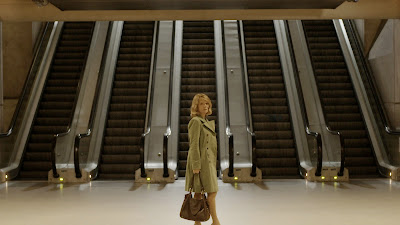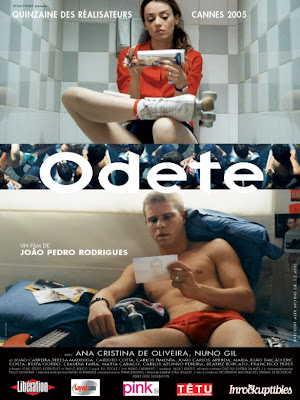After a short two month break following Cannes, the major film festival season begun again this week with the 66th Locarno Film Festival, which is the first in a quick succession of major premiere festivals in the autumn of each year followed closely by San Sebastián, Venice, and Toronto chronologically. In addition to those top tier festivals, there are a handful of other notable premiere fests that will be starting soon, including the Festival des Films du Monde in Montréal, the Tokyo International Film Festival, and the Torino Film Festival. Locarno opened with the latest Hollywood crime film from Icelandic director Baltasar Kormákur, 2 Guns, with Mark Wahlberg and Denzel Washington.
There are two main competitions that take place at Locarno: the Concorso Internazionale (International Competition) and the Concorso Cineasti del Presente ("Filmmakers of the Present" Competition for emerging filmmakers). Last year, the top prize of the Concorso Internazionale, the Golden Leopard, went to a surprise choice, Jean-Claude Brisseau's La fille de nulle part (The Girl from Nowhere). Pedro González-Rubio (Alamar) won the Golden Leopard in the Cineasti del Presente section with his documentary/narrative Inori. This year, the Concorso Internazionale features a mix of films from some major figures in Asian cinema as well as a few burgeoning auteurs.
You can access the full line-up for the Concorso Internazionale through Locarno's website, as I'm trying to steer clear of unnecessary list-making these days. The competition features the latest work from Shinji Aoyama (Eureka), Joanna Hogg (Unrelated), Hélène Cattet & Bruno Forzani (Amer), Albert Serra (Birdsong), Thomas Imbach (I Was a Swiss Banker), Kiyoshi Kurosawa (Tokyo Sonata), Júlio Bressane (Killed the Family and Went to the Movies), Emmanuel Mouret (Shall We Kiss?), Guillaume Brac (A World Without Women), Daniel & Diego Vega (October), David Wnendt (Combat Girls), Chang Tso-chi (When Love Comes), Pippo Delbono (La paura), Yervant Gianikian & Angela Ricci Lucci (Oh! Uomo), Joaquim Pinto (Twin Flames), Yves Yersin (Les petites fugues), and Hong Sang-soo, who will be presenting his second film of 2013 at the festival after Nobody's Daughter Hae-Won played in competition at the Berlinale. The only American film competing this year is Destin Cretton's Short Term 12, an expansion of his Sundance prize-winning 2008 short of the same name; Short Term 12 won the Grand Jury Prize and Audience Award at this year's SXSW Film Festival.
While several of the competition films have piqued my interest, there are two that top my list: Corneliu Porumboiu's When Evening Falls on Bucharest or Metabolism (Când se lasă seara peste Bucureşti sau metabolism) and Claire Simon's Gare du Nord. When Evening Falls on Bucharest or Metabolism is writer/director Porumboiu's first film following the international acclaim of Police, Adjective (Poliţist, adjective) in 2009—though he did co-write the screenplay with director Igor Cobileanski for The Unsaved (La limita de jos a cerului), which played in the East of the West Competition at the Karlovy Vary International Film Festival this past summer. Porumboiu's latest follows the exploits of a movie director (played by Bogdan Dumitrache, who won the Best Actor prize for the film The Best Intentions at Locarno in 2011) whose affair with one the actresses begins to disrupt the film shoot. In Gare du Nord, four strangers–played by Nicole Garcia, Reda Kateb (A Prophet), François Damiens (The Wolberg Family), and Monia Chokri (Heartbeats)–find casual encounters in the famous Parisian train station. The extensive ensemble cast also includes my biggest crush of the year, Christophe Paou from Alain Guiraudie's Stranger by the Lake (L'innconu du lac), Lou Castel, Samir Guesmi, Jean-Christophe Bouvet, André Marcon, Ophélia Kolb, and Jacques Nolot. Simon's sadly overlooked previous film, God's Offices (Les bureaux de Dieu), also utilized an enormous cast (including Emmanuel Mouret, whose new film is also in competition) in a single location, with Garcia again at the center of the picture. Additionally, Simon also has a documentary called Human Geography (Géographie humaine) screening at the festival out of competition that almost sounds like a non-fiction version of Gare du Nord.
As I don't have much to reference regarding the Concorso Cineasti del Presente, I'll instead focus on some of the other notable films playing and/or premiering at Locarno this year. Following winning turns in Xavier Dolan's Heartbeats (Les amours imaginaires) and Laurence Anyways, Canadian actress Monia Chokri, who can be seen in Gare du Nord, makes her directorial debut with the short An Extraordinary Person (Quelqu'un d'extraordinaire), which co-stars another Dolan regular, Anne Dorval. In the Piazza Grande section, you'll find the latest comedy from director Sam Garbarski (Irina Palm), Vijay and I, which stars Moritz Bleibtreu, Patricia Arquette, Michael Imperioli, Moni Moshonov, and Hanna Schygulla; cult French filmmaker Quentin Dupieux's black comedy Wrong Cops, which re-teams Laura Palmer's parents Grace Zabriskie and Ray Wise alongside Marilyn Manson, Eric Wareheim, and Jack Plotnick; a May-December Parisian romance between Michael Caine and Clémence Poésy in Sandra Nettelbeck's Mr. Morgan's Last Love, which also stars Gillian Anderson, Jane Alexander, and Justin Kirk; Jeremy Saulnier's acclaimed thriller Blue Ruin, which won the FIPRESCI Prize for the Quinzaine des Réalisateurs at Cannes this year; Sebastián Leilo's Gloria, the Best Actress winner (Paulina García) at this year's Berlinale, which will be playing soon at both the San Sebastián and Toronto Film Festivals; and the latest film from Swiss director Lionel Baier (Garçon stupide), Longwave (Les grandes ondes (à l'ouest)), a road movie/comedy with Valérie Donzelli and Michel Vuillermoz.
Two new shorts from directors João Pedro Rodrigues and João Rui Guerra da Mata, Mahjong and The King's Body (O Corpo de Afonso), will screen at the festival. The directors' previous feature The Last Time I Saw Macao (A Última Vez Que Vi Macau) played in the Concorso Internazionale last year. An experimental documentary co-directed by acclaimed filmmakers Ben Russell and Ben Rivers, A Spell to Ward Off the Darkness, will also play out of competition, alongside Que d'amour, the new film by director Valérie Donzelli, and How to Disappear Completely, the latest from Philippine director Raya Martin. In a special section highlighting the work some of the festival's jury members work, there will be a screening of the president of the Concorso Internazionale jury Lav Diaz's film Norte, the End of History, which played at in the Un Certain Regard section at Cannes earlier this year. There will also be a complete retrospective of the films of George Cukor at the festival, and it's always worth taking a look at their annual Open Doors section, which assists filmmakers in nations where funding can be difficult, as well as showing a selection of films from the particular region. This year, the focus is on the Southern Caucasus, highlighting films from Armenia, Azerbaijan, and Georgia. Expect some more festival guides to pop up on the blog over the next two months.
























































